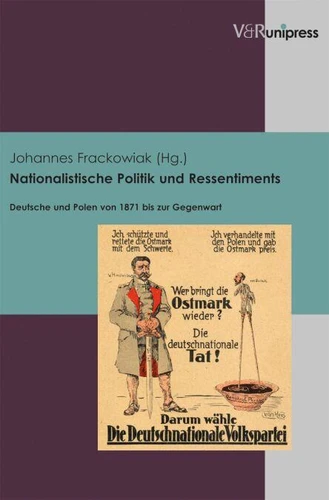Nationalistische Politik und Ressentiments. Deutsche und Polen von 1871 bis zur Gegenwart
Par : ,Formats :
Disponible dans votre compte client Decitre ou Furet du Nord dès validation de votre commande. Le format PDF est :
- Compatible avec une lecture sur My Vivlio (smartphone, tablette, ordinateur)
- Compatible avec une lecture sur liseuses Vivlio
- Pour les liseuses autres que Vivlio, vous devez utiliser le logiciel Adobe Digital Edition. Non compatible avec la lecture sur les liseuses Kindle, Remarkable et Sony
 , qui est-ce ?
, qui est-ce ?Notre partenaire de plateforme de lecture numérique où vous retrouverez l'ensemble de vos ebooks gratuitement
Pour en savoir plus sur nos ebooks, consultez notre aide en ligne ici
- Nombre de pages313
- FormatPDF
- ISBN978-3-8470-0152-2
- EAN9783847001522
- Date de parution19/06/2013
- Protection num.pas de protection
- Taille2 Mo
- Infos supplémentairespdf
- ÉditeurV&R Unipress
Résumé
What influence do nationalistic thinking and mutual resentments have on relations between Germans and Poles? In this volume, twelve historians, political scientists and social scientists from German, Poland and the Czech Republic shed light on the links between German and Polish nationalism. They set out from the German Empire's increasingly radical policy towards Poland and the antagonism between Germans and Poles that prevailed around the turn of the 19th/20th century.
A lot of space is devoted to the absolute low-point of German-Polish history, which was of course the Nazi occupation of Poland during the 2nd world war, and the subsequent expulsion of Germans from the areas east of the Oder and the Neiße. Contrary to impressions given in the media, there are hardly any resentments between the populations of these two countries today - which is the reassuring conclusion of the volume.
A lot of space is devoted to the absolute low-point of German-Polish history, which was of course the Nazi occupation of Poland during the 2nd world war, and the subsequent expulsion of Germans from the areas east of the Oder and the Neiße. Contrary to impressions given in the media, there are hardly any resentments between the populations of these two countries today - which is the reassuring conclusion of the volume.
What influence do nationalistic thinking and mutual resentments have on relations between Germans and Poles? In this volume, twelve historians, political scientists and social scientists from German, Poland and the Czech Republic shed light on the links between German and Polish nationalism. They set out from the German Empire's increasingly radical policy towards Poland and the antagonism between Germans and Poles that prevailed around the turn of the 19th/20th century.
A lot of space is devoted to the absolute low-point of German-Polish history, which was of course the Nazi occupation of Poland during the 2nd world war, and the subsequent expulsion of Germans from the areas east of the Oder and the Neiße. Contrary to impressions given in the media, there are hardly any resentments between the populations of these two countries today - which is the reassuring conclusion of the volume.
A lot of space is devoted to the absolute low-point of German-Polish history, which was of course the Nazi occupation of Poland during the 2nd world war, and the subsequent expulsion of Germans from the areas east of the Oder and the Neiße. Contrary to impressions given in the media, there are hardly any resentments between the populations of these two countries today - which is the reassuring conclusion of the volume.



